

CUED - ANSI C for Programmers on UNIX Systems: Constructions. C has the following loop and selection constructs:- Selection ... if (i==3) /* checking for equality; `!
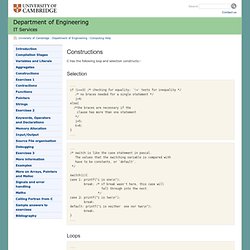
=' tests for inequality */ /* no braces needed for a single statement */ j=4; else{ /*the braces are necessary if the clause has more than one statement */ j=5; k=6; } ... Loops ... while(i<30){ /* test at top of loop */ something(); ... } ... do { something(); } while (i<30); /* test at bottom of loop */ ... The `for' construction in C is very general. ... for(i=0; i<5; i=i+1){ something(); } ... The general form of `for' is for ([expression1]; [expression2]; [expression3]) something(); where all the expressions are optional. ... expression1; /* initialisation */ while (expression2){ /* condition */ something(); expression3; /* code done each iteration */ }; ... E.g. the 2 fragments below are equivalent.
Within any of the above loop constructions, continue stops the current iteration and goes to the next and break stops the iterations altogether. Newb6.u-strasbg.fr/~siebert/pages/teaching/INFO-L2/Exercise_C_L2STUE.pdf. Phy.ntnu.edu.tw/~cchen/ctutor.pdf. C Programming if statement. Here, if is the keyword in C.
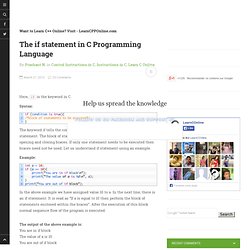
Syntax: if (condition is true){ /*block of statements to be executed*/ } The keyword if tells the compiler that what follows is decision control statement. The block of statements to be executed must be enclosed in opening and closing braces. If only one statement needs to be executed then braces need not be used. Example: int a = 10; if (a == 10){ printf(“You are in if block\n”); printf(“The value of a is %d\n”, a); } printf(“You are out of if block”); In the above example we have assigned value 10 to a. The output of the above example is: You are in if block The value of a is 10 You are out of if block Lets have a look at different expressions that can be used in if statement. a == b read as a is equal to b a!
/*Demonstration of if statement*/ int marks; printf(“Enter the marks:”); scanf(“%d”, &marks); if(marks>=35){ printf(“Congrats!!!”) In the above program, it will prompt you to enter the marks. C Programming Tutorial. Free Online Programming Course in C for Beginners. Learn C The Hard Way. The Basics of C Programming" The C programming language is a popular and widely used programming language for creating computer programs.
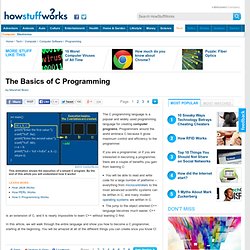
Programmers around the world embrace C because it gives maximum control and efficiency to the programmer. Learn C Programming, Free Programming Classes Online, How to write programs, C Programming for beginners. C exercises and solutions programming. C exercises intent to help you learn C programming language effectively.
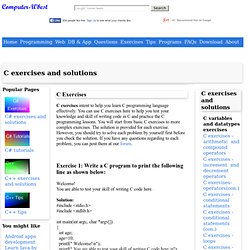
You can use C exercises here to help you test your knowledge and skill of writing code in C and practice the C programming lessons. You will start from basic C exercises to more complex exercises. The solution is provided for each exercise. However, you should try to solve each problem by yourself first before you check the solution. If you have any questions regarding to each problem, you can post them at our forum. Exercise 1: Write a C program to print the following line as shown below: Welcome! Solution: #include <stdio.h> #include <stdlib.h> int main(int argc, char *argv[]) { int age; age=10; printf(" Welcome! Exercise 2: Write five statements by using printf function to print the asterisk pattern: Exercise 3: Write a C program to declare two integer and one float variables then initialize them to 10, 15, and 12.6.
10 Programming with C Coding Exercises. If you're just beginning with C programming, test your skills with these projects.
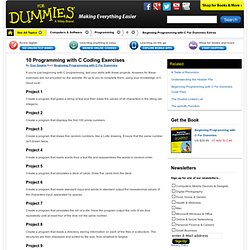
Answers for these exercises are not provided on the website. It's up to you to complete them, using your knowledge of C. Good luck! Project 1 Create a program that grabs a string of text and then totals the values of all characters in the string (as integers). Project 2 Create a program that displays the first 100 prime numbers. Project 3 Create a program that draws five random numbers, like a Lotto drawing.
Project 4 Create a program that reads words from a text file and reassembles the words in random order. Project 5 Create a program that simulates a deck of cards. Project 6 Create a program that reads standard input and sends to standard output the hexadecimal values of the characters input, separated by spaces. Project 7 Create a program that simulates the roll of a die. Why C has Pointers. “What?”
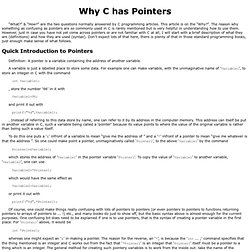
& “How?” Are the two questions normally answered by C programming articles. This article is on the “Why?”. The reason why something as confusing as pointers are so commonly used in C is rarely mentioned but is very helpful in understanding how to use them. However, just in case you have not yet come across pointers or are not familiar with C at all, I will start with a brief description of what they are (definitions) and how they are used (syntax). Quick Introduction to Pointers Definition: A pointer is a variable containing the address of another variable. A variable is just a labelled place to store some data.
Int Variable1; , store the number ‘96’ in it with.